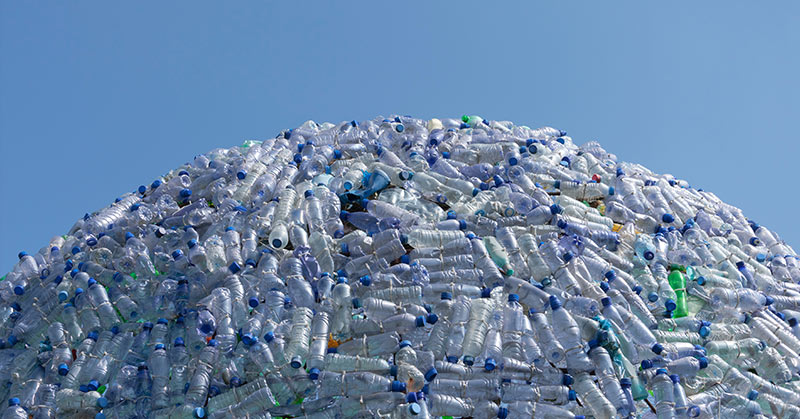Every year, more than 300 million tonnes of plastic is produced globally. Half of that is for single-use plastics, which leads to a staggering eight million tonnes of plastic that gets dumped into our oceans annually [1]. That plastic that we use for sometimes mere minutes, takes multiple lifetimes to break down. A single-use plastic bag takes ten to twenty years to decompose, while a plastic water bottle can take up to 450 years [2]. Now, plant-based bottles could provide a solution.
Because of this, our planet has become overrun with plastic. The plastic problem has become a global environmental crisis, and governments, companies, and environmental organizations around the world are looking for ways to reduce our reliance on the ubiquitous material.
There has been a large focus on switching to reusable materials, such as replacing plastic grocery bags with cloth, or encouraging people to buy a reusable water bottle instead of a plastic one. While this will certainly help the situation, there will always be a demand for single-use plastic, so some companies are focusing on other single-use alternatives.
Read: There Is No Excuse for You to Casually Drink Bottled Water
A Biodegradable Plant-Based Bottle Solution
The Dutch renewable chemicals company, Avantium, has partnered with major beverage makers to make plastics from plant sugars instead of fossil fuels. The project has remained on track despite coronavirus lockdowns, and the company’s CEO, Tom van Aken, is expecting to announce partnerships with other food and drink companies in the summer.
“This plastic has very attractive sustainability credentials because it uses no fossil fuels, and can be recycled – but would also degrade in nature much faster than normal plastics do,” he said [3].
The plant-based bottles will be resilient enough for use with carbonated drinks, and would decompose in one year in a composter, and a few years longer in regular outdoor conditions. Van Aken, however, says that ideally the product would be recycled.
This “plastic” will be made by breaking down plant sugars from corn, wheat, or beets into simple chemical structures, which can be rearranged to form new plant-based bottles[3].
Backed by Major Producers
The well-known beer company, Carlsberg, has already pledged its support of the project, and hopes to sell its beer in a cardboard bottle that is lined with an inner layer of the plastic. Coca-Cola and Danone are also backing the product, in an effort to ensure the continued success of their bottled products by being a part of a solution that is addressing environmental damage [3].
This is particularly important for Coca-Cola, since the company has come under fire recently after being named the world’s largest plastic polluter for two consecutive years.
Read: Company Is Using Plastic Bottles To Make Roads That Last 3x Longer Than Asphalt
The Eleventh Hour
This new product could not come soon enough, as plastic pollution around the world is rising every day. Scientists have now discovered microplastics in greater quantities than ever before on the seabed, which causes significant damage to marine ecosystems [4].
Dr Ian Kane, of the University of Manchester, explained that these microplastics on the seabed make their way through the food chain, eventually ending up on our dinner plate, where we unknowingly ingest them ourselves.
“The real problem is plastics that are sat around in the environment [which] can accumulate various pollutants and toxins on their surfaces,” he said. “There’s evidence that some of these toxins may be released when in the guts of organisms, and then you have the effect of the food chain, whereby small creatures are eaten by bigger creatures, and eventually you get to our fish stocks and you’re eating a nice piece of tuna containing decades-old microplastics contaminated with all sorts of nastiness.” [4]
Jacqueline Savitz, from the conservation group Oceana, says that something must be done to stop the amount of plastic that is being produced and used, citing that cleanups are insufficient, and recycling has been a largely ineffective solution.
“This relationship between microplastics hotspots and biodiversity hotspots compels us to act to turn off the plastic production faucet – it shows that cleanups will never suffice and that recycling has done little to address the problem. Sadly, the petrochemical industry is doing just the opposite, and it will fall on policymakers to stem the flow of plastics into our oceans.” [4]
Plant-Based Bottles With A Plan To Grow
It is without a doubt that Avantium’s new plant-based bottles are a much-needed solution to an increasingly dangerous problem, and if everything goes according to plan, we could begin seeing biodegradable plastic bottles on our shelves by 2023.
Initially, the project plans to make five thousand tonnes of plastic per year from plant sugars. In the grand scheme of plastic production, this is not a large amount, but the company expects demand for the product to grow as the demand for renewable plastics increases.
Eventually, they are planning to make their plastic from sustainably-sourced biowaste, so that the increased use of plant sugars for plastic production does not have a negative impact on the global food supply chain [3].
- https://plasticoceans.org/the-facts/
- https://www.keepcasscountybeautiful.com/images/PDF/Recycling/how_long_does_it_take_garbage_to_decompose.pdf
- https://www.theguardian.com/environment/2020/may/16/the-end-of-plastic-new-plant-based-bottles-will-degrade-in-a-year
- https://www.theguardian.com/environment/2020/apr/30/microplastics-found-in-greater-quantities-than-ever-before-on-seabed-currents-hotspots

